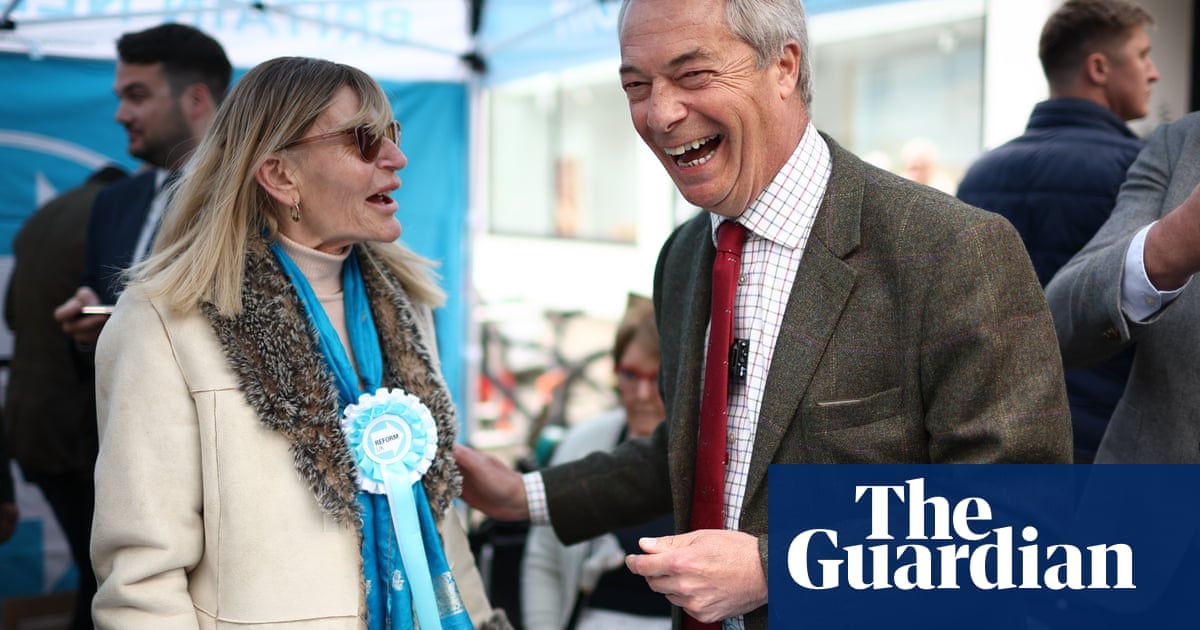TheLiberal Democratshave publicly challenged Nigel Farage to give details of his party’s donations after calculating that Reform UK spent more than £2m on personalised letters to postal voters before the local elections.
In a letter to Farage, Daisy Cooper, the Lib Dem deputy leader, said people needed to know the source of the money before Thursday’s elections, given that Reform received only £281,000 in donations in the last set of publicly available figures, for the final quarter of 2024.
Noting that Reform’s treasurer, Nick Candy,said last weekthat the party was targeting wealthy donors in low-tax overseas destinations such as Monaco, Cooper said Farage should “publicly rule out accepting any donations from wealthy donors linked to Russia or the Trump administration”.
In response, Reform said the campaign was being primarily funded by smaller donations, which do not need to be declared, and by its income from membership subscriptions.
Farage has promised to professionalise his party on the lines of the Lib Dems, who are famed for a relentless electioneering machine based on thousands of volunteers who knock on doors and deliver vast numbers of leaflets.
However, while Reform now has a large membership, it appears to still have a limited on-the-ground campaigning infrastructure, with the gap filled during the local election campaign with large numbers of paid-for leaflets mailed to voters.
The Lib Dems say Reform has sent two personalised direct mail messages from Farage to each of the 1.9 million people registered as postal voters for this round of local and mayoral elections acrossEngland, estimating this would cost about £2.1m.
This is the latest example of Reform’s increased resources, particularly in recent months.
In March, Farage launched the party’s campaignwith a rally, for which Reform hired out an arena in Birmingham that was decorated with carefully created props intended to convey the party’s message about a “broken” country, including a closed-down pub, a neglected bus stop and roads littered with potholes.
The mailouts feature a photo of Farage sitting next to a dog, with its text blaming migration for problems including a lack of housing and NHS waiting lists.
Under the law, parties have to declare donations of £500 or more to the Electoral Commission. The watchdog’s latest data, for donations in the last quarter of 2024, was released in March andshowed Reformraised £280,000 over that period.
Candy, a wealthy property developer, took over as Reform’s treasurer in December, with the party boasting that he would help bring in significant donations. However, it is not yet known whether this has happened, and if so where the money comes from.
Under electoral laws, individuals can only donate if they are on the UK electoral register. A change to the law passed under the Conservatives allowed people to do this even if they have lived outside the UK for more than 15 years, allowing Reform more scope to seek money from people based in places such as Monaco.
Cooper’s letter to Farage says she is writing “to request clarity over the sources of funding for Reform UK’s local election campaign”, noting the likely cost of the direct mail campaign, and Reform’s reported donations.
She wrote: “TheElectoral Commissionwill not publish information on donations for the first quarter of 2025 until after polling day on 1 May. That means that voters will not know the potential sources of funding for your party’s local election campaign before they cast their votes.
“So will you publicly rule out accepting any donations from wealthy donors linked to Russia or the Trump administration? And will you do that before this week’s local elections?”
A Reform spokesperson said: “The figures published by the Electoral Commission are large donations only. Our outstanding election campaign has been funded by Reform members, and grassroots small donors.
“Reform has two-and-a-half times as many members as the Liberal Democrats, so we understand how this would be an alien concept to them – 225,000 members x £25 per year is £5.6m.”
